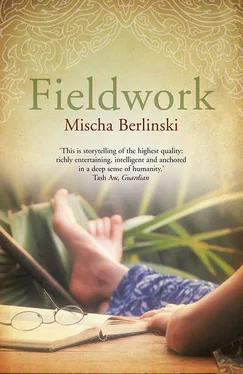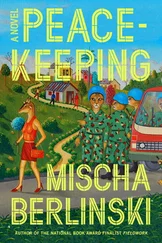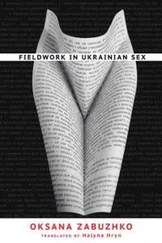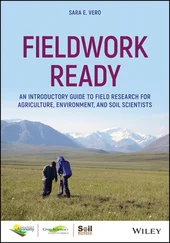Judith sat quietly for a minute. Then she said, "Mischa, do you know why that woman killed Uncle David?"
"No," I said. "I'm trying to find out."
"Can I tell you something?"
"Of course."
"And you promise you won't think Grandma and Grandpa are bad people?"
"Of course I promise."
"I once heard Grandma and Grandpa have a fight about David. A big fight. It was just a little after I got there. I wanted to go out after school and Grandpa didn't want to let me, and I don't know how it happened, but Grandma and Grandpa started fighting — I don't think I should be telling this to you."
I didn't say anything, and Judith kept going.
"In any case, they were fighting, and Grandma started yelling at Grandpa, ‘You're going to drive her out of this house, just like David.' And Grandpa, he got so mad. He said, ‘Don't talk to me about David. If you had done what any decent Christian woman would do, David would still be here today.' It was awful. I was upstairs in my bedroom, and even with the door closed I could hear them in their room. Grandma said, ‘You brought that woman into this house. Don't ever forget, you brought that woman into this house.' I always wonder still what they were talking about. Later that night I heard them singing hymns downstairs."
A few minutes later, Judith stood up to go. She looked at me searchingly for a moment, and I could see her grandmother's shrewd eyes inset in a still young, unlined face. "Last year it was this girl Sarah Kennedy's birthday? At school? She had a party at a guest house in the mountains, and I think you should go up there."
"Why?"
"Because I think the owner of the place used to be Martiya's guide in the mountains. His name is Vinai. I think he knows all about her."
Judith looked around the room again.
"But if you go, please don't tell Grandma and Grandpa that I told you about it. Because I told them that I was going on a Bible retreat."
I left for the Hiker Hut that same day, traveling by motorbike.
When I first began driving in Thailand, one of the teachers at Rachel's school — Mr. Robert, a devout Buddhist, as it happened — gave me a piece of pointed advice. Distrust everyone , he said, for no one— absolutely no one — on the Thai highway is your friend. A people renowned for their calm and delicate nature, the Thai are nevertheless among the most aggressive of all the world's drivers, yielding lunatic pride of place only to the pacifistic, vegetarian Hindu.
But the Thai system allows for a certain flexibility: my little Honda Dream hugged the far left-hand margin of the highway, and the unwritten rules of the Thai road allowed me to cruise along as slowly as I wanted, past bamboo shacks where old ladies in sarongs sold coconut milk and fanned themselves with giant palm fronds. On either side of the road leading out of the lowlands, there were rice paddies being worked by very little women in broad hats and high boots, trudging slowly across immense flat fields, bent at the waist. A Thai proverb summarizes the life of a peasant farmer: "Back to the sun, face to the earth."
Then the road snaked into the mountains. A twenty-minute climb; I passed three elephants, led by mahouts, walking trunk in tail; my ears popped — and northern Thailand exploded in light. The plain of Chiang Mai had been a gloomy checkerboard of rice and sludge; the mirrored temple roofs had reflected a dark sky. But as soon as I hit the hills, the weather changed. Sweet flimsy mountain clouds floated across an open sky, and I could smell wild jasmine, honeysuckle, hibiscus, and something strangely like lemon tea. The paddies were terraced on the mountain slopes like a wedding cake made of mud: each glossy layer reflected the emerald hills, the azure sky, and the wild palms. At the very top of the wedding cake, short crabbed trees in radiant red blossom marked the place where the jungle began. Somewhere along the way, a mountain summit had been leveled to make way for a stupendously large yellow Buddha, who looked out impassively from his high perch over the mountains and the plains, his cherry lips ladylike. Mysterious dirt roads forked out every now and again, leading off to God-knows-where. I wanted to follow them all.
When I came to the hot springs, following the instructions that Judith had offered me, I made a left turn and crossed a small bridge that led onto a narrow red-dirt road. This took me up through little villages filled with rooting pigs and houses on stilts with tin roofs. Small children looked at me gravely.
Then the country changed again, the green turning golden with altitude. Some parts of the hill were on fire, and other slopes were black and charred. This was the real mountain country. A little brown stream wandered by the side of the road. A young boy led a humped bullock by the nose. I decided to defy the odds and took off my sweat-drenched helmet. A warm wind tousled my hair.
I came to a long, low teak building nestled on the side of a hill, looking out over an exuberant field of yellow sunflowers. A sign read the hiker hut, in both English and Thai. Sprawled in a hammock in the shade of two big trees, a small silver-haired man plucked at his guitar. He didn't look up as I approached, and only when I was two-thirds of the way up the walk did he stop strumming. He put the guitar aside, rolled himself up to standing, and with an air of lazy cool asked me in English with only the slightest hint of an accent if he could help me.
It's very disconcerting the way the Thai laugh and smile at bad news. When I told Khun Vinai that Martiya was dead, he smiled. Maybe his smile meant: She suffered for a long time and it's best this way.
But maybe it meant: It served her right.
Or maybe it just meant: Huh.
The Hiker Hut was a collection of little huts, each in the traditional style of a different hill tribe. There was an Akha house, with its roof like a plump hive of mountain grasses; and a Lisu hut, with an elegant long front porch; and a cylindrical Karen house, tall and stately. There was a Mien cottage, a Hmong hut, and a Palaung long house, large enough for a convention of Palaung stockbrokers on a junket.
I, of course, stayed in the Dyalo hut.
The thin cotton mattress was the only concession to Western taste; the Dyalo, I well knew, typically slept on the floor. But in all other respects, Khun Vinai later told me with pride, so perfectly authentic were his tribal huts that once a visiting British television program was able to produce an entire documentary about the lives of the tribal peoples without ever leaving the property.
I spent the better part of the afternoon lying in the hammock that Khun Vinai had vacated, reading the Bible. After all those meetings with the Walkers, I had realized with a shameful start that I had never read much of the Good Book. His eyes were as a flame of fire, and on his head were many crowns; and he had a name written that no man knew, but he himself. And he was clothed with a vesture dipped in blood: And his name is called The Word of God. That's from Revelation. I wondered what that sounded like in Dyalo.
There were two other guests at the Hiker Hut, a young blond couple. From the hammock where I had installed myself, I watched them mount the hill and climb into their Akha hut. I had dinner with them that evening. I didn't really have a choice: there was only one restaurant in the village, managed by Khun Vinai's wife, and it would have seemed strange if I had said no. They were both from Denmark, and they told me a lot of things I didn't know about the hill-tribe villages: all of the villages in this valley, Henrietta said, were part of a program sponsored by the king of Thailand to substitute other crops for opium. The whole thing was an American idea. That's why there were so many strawberry and tomato fields. Later, I tasted the strawberries. They were bitter and chalky. I had my doubts.
Читать дальше












